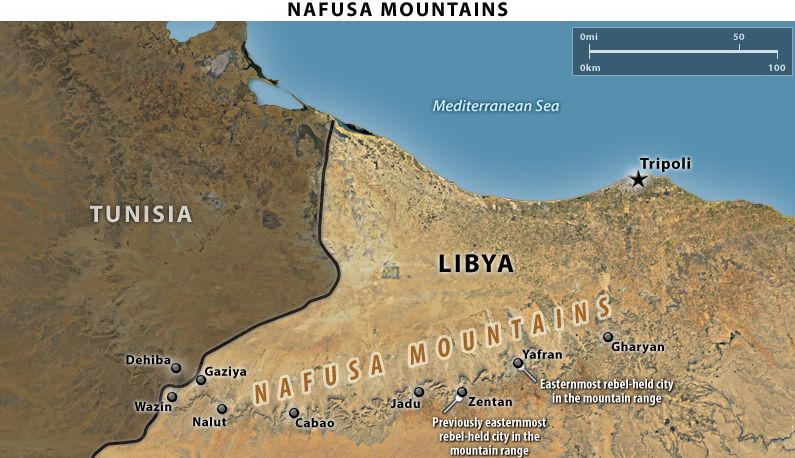Libyan
leader Moammar Gadhafi has repeatedly said that he intends to remain in Libya
until the end. Meanwhile, his forces are fighting rebels in several areas,
including the Nafusa
Mountains, where the rebel spokesman is Moussa Ibrahim.
The
rebels in the Nafusa Mountains are separate from
those in the coastal town of Misurata and those in eastern Libya,
which is the Libyan opposition’s heartland. The guerrillas for who the current
spokesman is Moussa
Ibrahim are predominantly ethnic Berbers, not Arabs, though the populations
in these areas are mixed. While most Libyans live in the flat coastal strip at
the Libyan core, the country’s Berbers are mountain people, living in a range
that extends for almost 225 kilometers (140 miles) to the border with Tunisia.
They have sustained their rebellion, which has so far brought all but 50 or so
kilometers of this line under their control, primarily because of their
elevated position, their control of one of the two border crossings with
Tunisia, and the NATO airstrikes that began in the region in April.

The
Nafusa Mountain rebels are oriented more toward Tunisia for their line of
supply than toward the sea, as rebels in Misurata and Benghazi are. And
although a supply network connects Benghazi to the rebel positions in the
mountains — using Tunisian ports and land routes as a conduit — the sheer
distance and logistical difficulty makes the connection tenuous. The Berbers
historically have had poor relations with Gadhafi, an Arab who sought to
suppress their ethnic identity. Therefore, they openly support the cause
espoused by the Benghazi-based National Transitional Council — to oust Gadhafi
and reunify the country with Tripoli as its capital — but their primary focus
is on maintaining autonomy in their home territory, not seizing Tripoli.
The
Berber rebels have fared well recently. They seized the
Wazin-Dehiba border crossing on May 19, 2011. And while a number of towns
in the Nafusa Mountains remain outside rebel control — it
is to be expected that most of the mountain range will soon be held by the
rebels.
The
Berbers appear to be succeeding in mountainous terrain against comparatively
isolated elements of loyalist forces that may have been neither particularly
enthusiastic for battle nor properly equipped and supplied. But when the
battleground shifts to the approaches to Tripoli along the coastal plain, the
terrain opens up, providing less protection to offensive forces and allowing
attackers to be targeted at a greater distance. Furthermore, the terrain is
more familiar to loyalist forces and appropriate for their heavier weaponry.
The
Berbers have shown no inclination to move into the lowlands and fight Gadhafi’s
forces closer to Tripoli. There is little indication that they can sustain
combat at significant distances from their base of power against a
well-defended urban area — a tactical situation that would be difficult even
for the best-trained and best-equipped military forces. The Berbers lack the
troop-transport capability to deliver a sizable force to Tripoli. They are also
poorly armed, even compared to the coastal rebels. The ad hoc weapons factories
that have been so crucial to the success in Misurata and on the eastern front
do not exist in this region on the same scale as on the coast. There are no
fleets of “technicals” — pickup trucks rigged with machine guns — waiting to
ferry fighters from the mountains to Tripoli.
Conclusion
Information
about the state of the Libyan military and its supplies is opaque; there is
little indication that Gadhafi prioritized or dedicated many forces or supplies
to the Nafusa Mountains in general, which could reflect a decision to apply his
resources toward more important fronts along the coast. I
mentioned since the beginning of this conflict that Gadhafi would
not be able to reunify Libya under his rule- yet he apparently continues to
maintain hope that he can outlast the NATO air campaign.
In
fact Gadhafi in the end could indeed compel the West to come to an agreement on
some form of partition. In fact while publicly he denies that partition is his
objective, but with total victory out of the question, this is the best
possible outcome remaining for the Libyan leader.
![]()